THE BOSS is messy, rude and laugh out loud hilarious.
Is it a great film?
Nope.
Neither is STRIPES.
But, like that Bill Murray classic, sometimes you don't need to offer great film making to be a classic.
In THE BOSS, Melissa stars as Michelle Darnell -- think Donald Trump or any ego maniac.
She's rich because she doesn't give a damn about anyone.
That includes her mentor -- Kathy Bates in two hilarious scenes.
She walks on everyone until she loses everything and meets her assistant's daughter Rachel.
Rachel's her way into a family -- something denied her repeatedly as a child. (One family after another returned her to the orphanage.)
Unable to deal with these feelings, she destroys the new family she has and then has to figure out how to get them back.
Before you groan, it's not a heavy handed turn.
When it comes, she devises a break in and that's actually another giddy high for the film.
You'll laugh about the debate over "suck a dick."
I'm not lying here.
I hate Tyler Labine.
Hate him everything.
Can only tolerate him in this film until the break in -- at which point, even he wins me over.
Her assistant?
Kristen Bell.
She never wins me over.
She's funny in some scenes, a wet blanket in others.
But throughout, you're always aware she's a Wal-Mart version of Sarah Michelle Geller. You never forget that Sarah's perfected this part before.
You never forget that Kristen was the barely watched Veronica Mars while Sarah was the legendary Buffy.
I have no idea how Kristen got in the movie.
I'll assume she and her agent made a deal with the devil.
She adds nothing to the movie at all.
Nothing.
Any actress could have played that role better.
Jennifer Love Hewitt, Alyssa Milano, Thandie Newton, go down the list.
This is her lucky break and she's not even smart enough to run with it.
She's never more than adequate throughout the film.
Melissa's hilarious.
She wins you over yet again.
Ben Falcone (her husband) directs.
The film could have used more shaping -- both in terms of directing and in terms of writing (Melissa and Ben wrote the script with Steve Mallory).
But it's a laugh out loud comedy and we really need those lately as bad as things are going.
The audience erupted in gales of laughter throughout the film.
We saw it Friday night and again on Saturday to catch what we'd missed due to the laughter.
It's just as funny the second time around.
Going out with C.I.'s ''Iraq snapshot:"
Saturday, April 9, 2016. Chaos and violence continue, John Kerry visits
Iraq, the persecution of the Sunnis remains unaddressed, and much more.
Today, the US Defense Dept announced/boasted:
Strikes in Iraq
Attack, fighter, ground attack and remotely piloted aircraft and rocket artillery conducted 21 strikes in Iraq, coordinated with and in support of Iraq’s government:
-- Near Huwayjah, a strike destroyed an ISIL heavy machine gun.
-- Near Albu Hayat, a strike destroyed two ISIL rocket rails and 22 rockets.
-- Near Habbaniyah, a strike destroyed an ISIL vehicle and an ISIL mortar system and suppressed an ISIL tactical unit.
-- Near Haditha, a strike struck an ISIL tactical unit and destroyed two ISIL fighting positions.
-- Near Hit, four strikes struck a large ISIL tactical unit and destroyed 10 ISIL fighting positions, an ISIL heavy machine gun, an ISIL artillery piece, an ISIL anti-air artillery piece, 30 ISIL boats and an ISIL tactical vehicle.
-- Near Kirkuk, a strike destroyed an ISIL fighting position.
-- Near Kisik, two strikes destroyed an ISIL command and control node and an ISIL tunnel system.
-- Near Mosul, three strikes struck an ISIL tactical unit and an ISIL financial storage center and destroyed three ISIL rocket rails.
-- Near Qayyarah, four strikes struck an ISIL weapons storage facility, destroyed two ISIL vehicle bombs and denied ISIL access to terrain.
-- Near Sinjar, a strike suppressed an ISIL tactical unit.
-- Near Sultan Abdallah, a strike denied ISIL access to terrain.
-- Near Tal Afar, a strike struck an ISIL headquarters.
Task force officials define a strike as one or more kinetic events that occur in roughly the same geographic location to produce a single, sometimes cumulative, effect. Therefore, officials explained, a single aircraft delivering a single weapon against a lone ISIL vehicle is one strike, but so is multiple aircraft delivering dozens of weapons against buildings, vehicles and weapon systems in a compound, for example, having the cumulative effect of making those targets harder or impossible for ISIL to use. Accordingly, officials said, they do not report the number or type of aircraft employed in a strike, the number of munitions dropped in each strike, or the number of individual munition impact points against a target.
These bombs having been going on daily since August of 2014. This is how US President Barack Obama thinks he can defeat the Islamic State.
Bombing Iraqis -- including civilians whose only 'crime' is living actually creates sympathy for the Islamic State.
Nouri al-Maliki's persecution of the Sunnis throughout his second term as prime minister (2010 through 2014) created the space for the Islamic State to thrive in Iraq.
We warned about it here.
We noted how the prison breaks were going.
Sunnis breaking out weren't turned in by people living in the Sunni community.
That was because the Sunnis were being persecuted and wrongly and falsely imprisoned.
So when they broke out, there wasn't a public concern or need to turn them in.
The Sunnis felt more and more disenchanted with the government that was supposed to be their government and protect them.
Elise Labott (CNN and State Dept unpaid employee) types, "U.S. Secretary of State John Kerry arrived for an unannounced visit to Baghdad on Friday, as the country's political crisis threatens the fight against ISIS."
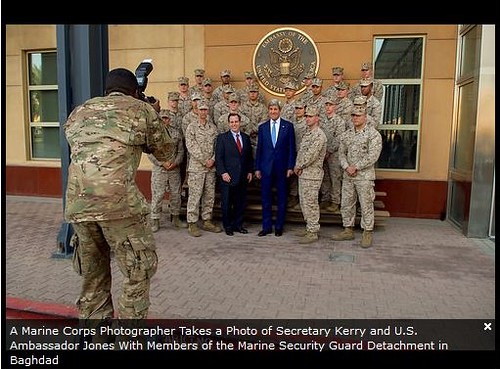
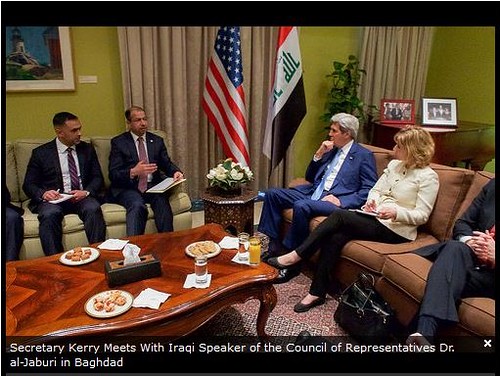
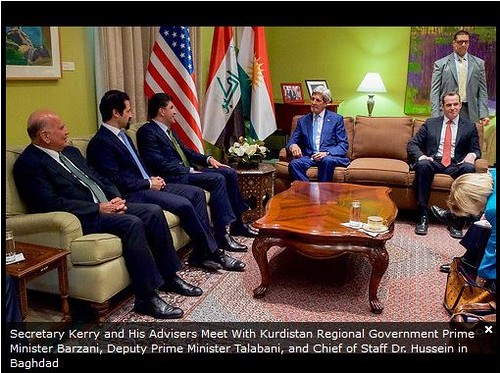
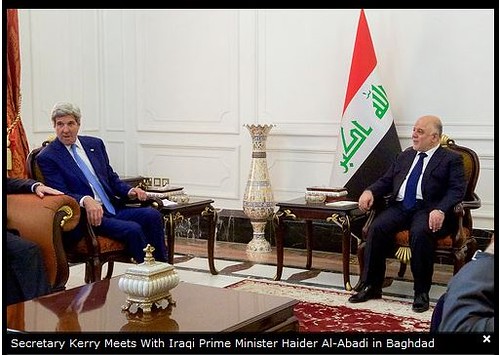
Today, the US Defense Dept announced/boasted:
Strikes in Iraq
Attack, fighter, ground attack and remotely piloted aircraft and rocket artillery conducted 21 strikes in Iraq, coordinated with and in support of Iraq’s government:
-- Near Huwayjah, a strike destroyed an ISIL heavy machine gun.
-- Near Albu Hayat, a strike destroyed two ISIL rocket rails and 22 rockets.
-- Near Habbaniyah, a strike destroyed an ISIL vehicle and an ISIL mortar system and suppressed an ISIL tactical unit.
-- Near Haditha, a strike struck an ISIL tactical unit and destroyed two ISIL fighting positions.
-- Near Hit, four strikes struck a large ISIL tactical unit and destroyed 10 ISIL fighting positions, an ISIL heavy machine gun, an ISIL artillery piece, an ISIL anti-air artillery piece, 30 ISIL boats and an ISIL tactical vehicle.
-- Near Kirkuk, a strike destroyed an ISIL fighting position.
-- Near Kisik, two strikes destroyed an ISIL command and control node and an ISIL tunnel system.
-- Near Mosul, three strikes struck an ISIL tactical unit and an ISIL financial storage center and destroyed three ISIL rocket rails.
-- Near Qayyarah, four strikes struck an ISIL weapons storage facility, destroyed two ISIL vehicle bombs and denied ISIL access to terrain.
-- Near Sinjar, a strike suppressed an ISIL tactical unit.
-- Near Sultan Abdallah, a strike denied ISIL access to terrain.
-- Near Tal Afar, a strike struck an ISIL headquarters.
Task force officials define a strike as one or more kinetic events that occur in roughly the same geographic location to produce a single, sometimes cumulative, effect. Therefore, officials explained, a single aircraft delivering a single weapon against a lone ISIL vehicle is one strike, but so is multiple aircraft delivering dozens of weapons against buildings, vehicles and weapon systems in a compound, for example, having the cumulative effect of making those targets harder or impossible for ISIL to use. Accordingly, officials said, they do not report the number or type of aircraft employed in a strike, the number of munitions dropped in each strike, or the number of individual munition impact points against a target.
These bombs having been going on daily since August of 2014. This is how US President Barack Obama thinks he can defeat the Islamic State.
Bombing Iraqis -- including civilians whose only 'crime' is living actually creates sympathy for the Islamic State.
Nouri al-Maliki's persecution of the Sunnis throughout his second term as prime minister (2010 through 2014) created the space for the Islamic State to thrive in Iraq.
We warned about it here.
We noted how the prison breaks were going.
Sunnis breaking out weren't turned in by people living in the Sunni community.
That was because the Sunnis were being persecuted and wrongly and falsely imprisoned.
So when they broke out, there wasn't a public concern or need to turn them in.
The Sunnis felt more and more disenchanted with the government that was supposed to be their government and protect them.
Elise Labott (CNN and State Dept unpaid employee) types, "U.S. Secretary of State John Kerry arrived for an unannounced visit to Baghdad on Friday, as the country's political crisis threatens the fight against ISIS."




Conferring w/@JohnKerry today in #Iraq. Key meetings w/PM, Speaker, FM, KRG PM. Focus: uniting forces against #ISIL.
Nathan King (CCTV) reports:
It was with ISIL in mind that Kerry made his unannounced stop in Baghdad. Iraqi government forces, with U.S. backing, are poised to retake Mosul, Iraq’s second largest city. Kerry had a message of encouragement.
[. . .]
Kerry’s visit comes at a time of continued division among Iraq’s politicians and ethnic groups. Sunnis are still not convinced that a Shiite dominated government in Baghdad is a better alternative than ISIL.
And Kerry does nothing to address this or to call for Haider al-Abadi to address it.
Haider is the prime minister now because Barack and the Iranian government could agree on installing him.
The Iraqi people are not the ones picking their prime minister. They have no say.
Arhsad Mohammed, Maher Chmaytelli, Stephen Kalin, Janet Lawrence and John Stonestreet (REUTERS) report:
U.S. Secretary of State John Kerry, visiting Baghdad on Friday, urged Iraq not to let its political crisis interfere with the fight against Islamic State and voiced unequivocal support for Iraqi Prime Minister Haider al-Abadi.
Abadi last week unsettled Iraq's political elite with a proposed cabinet reshuffle that aims to curb corruption by replacing long-time politicians with technocrats and academics.
Haider is doing what the US government wants, not what the Iraqi people want.
The lack of support from the Iraqi people is why so many Iraqi politicians can -- and have -- speak out agains the proposals.
Kerry feels the ongoing political crisis might "interfere."
Well, why not address that crisis?
In fact, when will that crisis be addressed.
Let's go back to June 19, 2014, when Barack Obama acknowledged the need for a political solution in Iraq.
US President Barack Obama: Above all, Iraqi leaders must rise above their differences and come together around a political plan for Iraq’s future. Shia, Sunni, Kurds -- all Iraqis -- must have confidence that they can advance their interests and aspirations through the political process rather than through violence. National unity meetings have to go forward to build consensus across Iraq’s different communities. Now that the results of Iraq’s recent election has been certified, a new parliament should convene as soon as possible. The formation of a new government will be an opportunity to begin a genuine dialogue and forge a government that represents the legitimate interests of all Iraqis.
Now, it’s not the place for the United States to choose Iraq’s leaders. It is clear, though, that only leaders that can govern with an inclusive agenda are going to be able to truly bring the Iraqi people together and help them through this crisis. Meanwhile, the United States will not pursue military options that support one sect inside of Iraq at the expense of another. There’s no military solution inside of Iraq, certainly not one that is led by the United States. But there is an urgent need for an inclusive political process, a more capable Iraqi security force, and counterterrorism efforts that deny groups like ISIL a safe haven.
Rise above their differences?
When's that happening?
Here he is still speaking on June 19, 2014:
But I don’t think there’s any secret that right now at least there is deep divisions between Sunni, Shia and Kurdish leaders. And as long as those deep divisions continue or worsen, it’s going to be very hard for an Iraqi central government to direct an Iraqi military to deal with these threats.
And so we’ve consulted with Prime Minister Maliki, and we’ve said that to him privately. We’ve said it publicly that whether he is prime minister, or any other leader aspires to lead the country, that it has to be an agenda in which Sunni, Shia and Kurd all feel that they have the opportunity to advance their interests through the political process. And we’ve seen over the last two years, actually dating back to 2008, 2009 -- but I think worse over the last two years -- the sense among Sunnis that their interests were not being served, that legislation that had been promised around, for example, De-Ba’athification had been stalled.
I think that you hear similar complaints that the government in Baghdad has not sufficiently reached out to some of the tribes and been able to bring them in to a process that gives them a sense of being part of a unity government or a single nation-state. And that has to be worked through.
Nothing has changed.
The wedge is still the same, the Sunnis are still persecuted.
Haider al-Abadi's done nothing to address that persecution.
The White House, the State Dept, nothing has been done to encourage Haider to address this issue.
In February, Tim Arango (NEW YORK TIMES) reported:
When Iraqi ground forces and American aircraft began assaulting the city of Ramadi more than a month ago, Ghusoon Muhammed and her family fled to the government’s front line, as did many other Sunni Arab families who had been trapped for months. Soldiers sent her and the children one way, and her husband another, to be interrogated in a detention facility.
She has not seen him or heard from him since. She and her children, who will most likely not be able to go home to Ramadi for months given the destruction, have been left to wait in a ramshackle tent camp here in Anbar Province. She is desperate, and adamant: "The innocent people in jail need to be released!" she said.
Standing nearby on Sunday was another woman, Karima Nouri. Her son an auto mechanic, was also taken away by the authorities, and she has had no word about him for weeks. Ms. Nouri said the government considered civilians who remained in Ramadi to be sympathizers of the Islamic State.
Today, Elise notes, "The top U.S. diplomat's visit, which was not made public until Kerry arrived, is part of an effort to shore up an embattled prime minister fighting to stay in office."
The rumors sweeping Iraq last month was that the United Kingdom's ambassador to Iraq was speaking with Ayad Allawi about becoming the next prime minister.
So John's trip was an attempt to rally support for the ineffectual and disappointing Haider.
That's all it was.
And the ongoing persecution of Sunnis?
Shia militias crimes #Iraq
عاجل الحشد الشيعي الارهابي يحرق العوائل السنيه العراقية في ديالى افضحوهم
حسبنا الله
Graphic pics
Iraqi Sunnis civilians burned & killed by Shia militias backed by Iran
#warcrimes
My heart is broken
#warcrimes
عاجل الحشد الشيعي الارهابي يقتل امرأة سنيه عراقية امام اطفالها في بغداد
اين الاعلام من هذه المجازر ضدنا
#Iraqi army murders a mother from Sunni sect in front of her children in Baghdad.without guilt
#warcrimes
#warcrimes
هذه المجازر بحقنا اصبحت يوميا
هي المحرقة
بعد عدة سنيين سيظهر المنافقين الذين خرسوا الان ليتباكوا علينا
John Kerry didn't acknowledge it, let alone address it.
iraq
cnn
elise labott
 Brett McGurk
Brett McGurk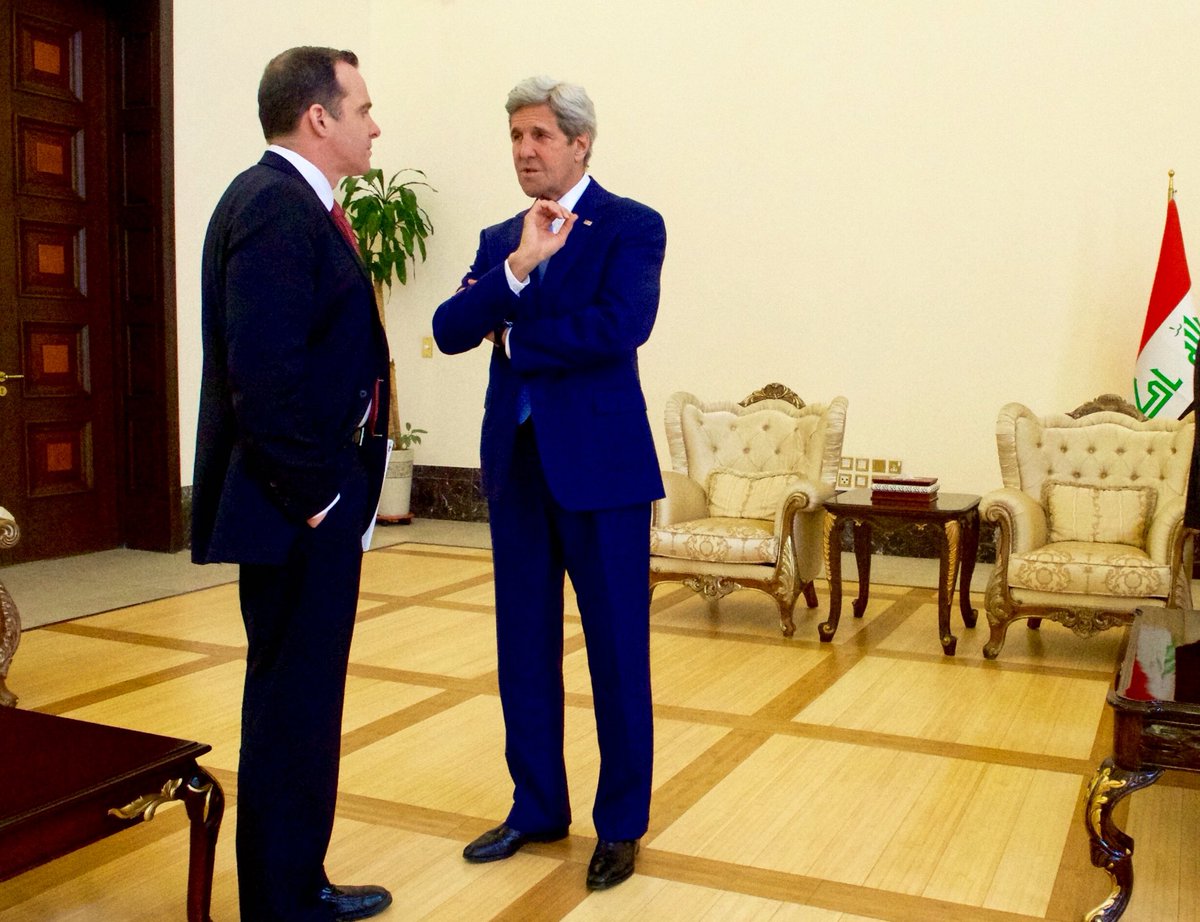
 #IRAQ شمرية العراق
#IRAQ شمرية العراق 




No comments:
Post a Comment